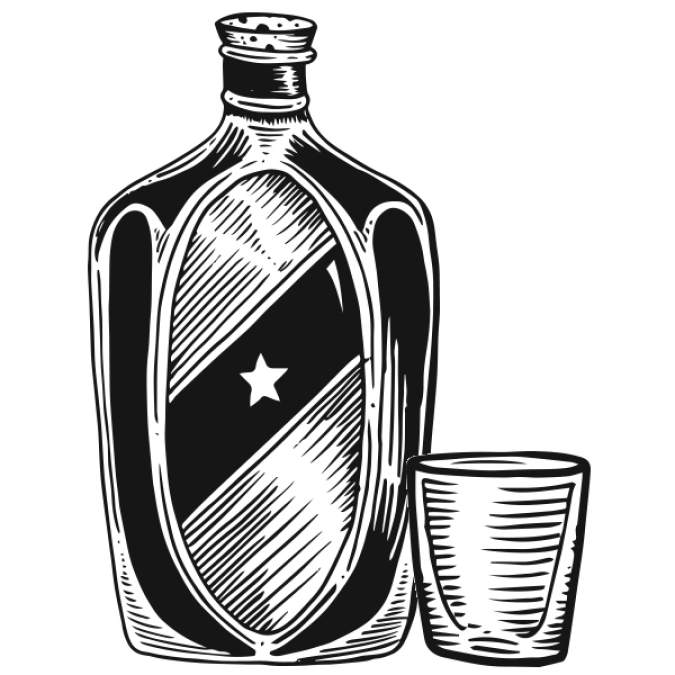It’s a moment most of us have fantasized about: An alluring guest makes his or her way into our home, and instead of just a can of beer or two-day-old bottle of wine, we offer a mixed drink. At their assent, we sidle over to our bar, and with equal parts prestidigitation and alchemy (you know, James Bond–style), a near-magical elixir is conjured. Or perhaps the dream is to throw a swanky cocktail party swimming in elegance, class, and decadence. Or, you know, you could just want to be able to make yourself a drink after work.
Whatever your ultimate intent, creating and developing a home bar requires a bit of thought and planning and a trip or two to a liquor store. Over four columns, I’m going to guide you through the process. Part One will cover the basics: the ingredients you need to make the most classic cocktails. Part Two (next week) will cover making those drinks, and a few different ways to improvise. Part Three (Sept. 11) will cover bar tools, glassware, garnishes, and techniques, while Part Four (Sept. 18) will highlight a few other spirits and mixers that will expand your possibilities greatly.
So let’s jump right in. While there’s plenty of room for debate, I’d say that the cocktails any self-respecting home bartender needs to be prepared to make include these classics: the martini, the Manhattan, the Old Fashioned, the margarita, the mojito, the sidecar, the lemon drop, and the French 75. These cocktails require at least one of the major classes of spirits—gin, vodka, whiskey, tequila, rum, brandy—and minimal other mixers (dry and sweet vermouth, bitters, orange liqueur, sparkling wine), yet they make delicious cocktails that will impress your friends.
So what spirits should you buy? The answer depends somewhat on your budget and personal tastes, but generally speaking you’ll get more bang for your buck in some areas than others. Unless you’re a die-hard vodka drinker, this is a good place to skimp: As long as you’re not buying utter trash, you’ll be fine. I like Monopolowa, an inexpensive Austrian potato vodka. Gin is trickier, and worth more of a splurge; Beefeater, though, is reasonably priced and works well in most cocktails, while Plymouth is similar but more refined if you’d like something classier.
When it comes to whiskey, you’ll want to have a bourbon and a rye (ryes are lighter, leaner, and spicier, which means you can mix them with sweeter ingredients without making the drink too sweet). Elijah Craig and Buffalo Trace are good and affordable bourbons, and the locally made Oola bourbon is a quality spirit, too. For rye, Old Overholt or Rittenhouse are straightforward and easy to integrate into a cocktail, while Woodinville Whiskey Co.’s rye can lend a wonderful spicy note to Manhattans and Old Fashioneds.
I like to stock slightly aged tequilas and rums, since they’re more versatile than very young and very old ones. Cazadores or Hornitos Reposado are nice tequilas, but there are tons of relatively inexpensive rums to be found. A white rum is also a good choice (if you feel like having two), especially if you’re going to be making summery drinks like mojitos a lot. I like Ronrico. As for brandy, I tend to prefer French brandies for cocktails due to their smoothness and affordability: Jacques Cardin is the right price and is mixing-friendly.
Regarding mixers, don’t go super-cheap on vermouth. I love Dolin’s sweet and dry vermouths, and fortunately they’re sold in 375-milliliter bottles, so you don’t have to worry as much about waste. (Vermouth should always be refrigerated, since it’s essentially slightly fortified white wine.) For orange liqueur, triple sec is inexpensive, but I prefer Cointreau in almost all applications. If you’ve got the extra $20, the more natural orange flavor and slightly muted sweetness will make a difference in that margarita. Angostura bitters are the only real must-have, though picking up others is a fun and relatively affordable way to expand your bar, as we’ll touch on later.
Finally, a few notes on ingredients and techniques. Fresh citrus juice is essential to making a quality cocktail, and you should take it seriously. If you’re making only one or two drinks, squeeze it to order. Otherwise, squeeze ahead of time; it’ll keep for a day or two in the fridge. (Always make sure to strain out the pulp and seeds.) Simple syrup will make your life much easier when it comes to adding sweetness to drinks. It’s incredibly, well, simple to make: Start with two parts sugar to one part water and heat it gently until the sugar dissolves. Let it sit over low-medium heat for a couple of minutes, stirring occasionally, then let it cool. It’ll keep for a couple of weeks in the fridge in a tightly sealed container.
Next week: the drinks!
thebarcode@seattleweekly.com






